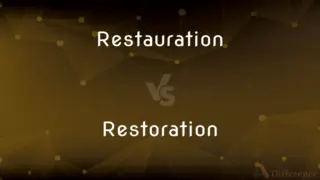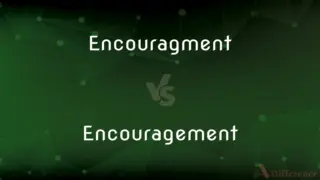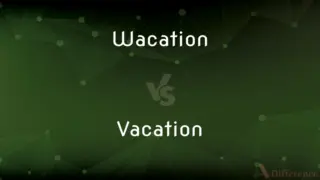Ofcourse vs. Of course — Which is Correct Spelling?
Edited by Tayyaba Rehman — By Fiza Rafique — Updated on March 28, 2024
"Ofcourse" is incorrect; the right spelling is "of course," indicating certainty or acknowledgement.
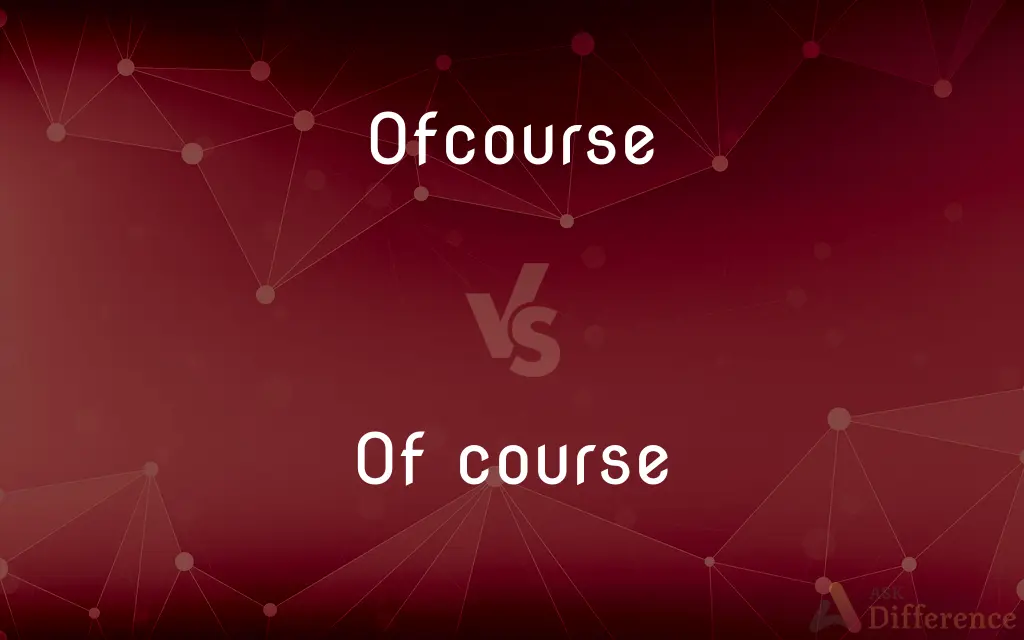
Table of Contents
Which is correct: Ofcourse or Of course
How to spell Of course?

Ofcourse
Incorrect Spelling

Of course
Correct Spelling
ADVERTISEMENT
Key Differences
Think of "of course" as two separate words: the preposition "of" and the noun "course."
There's a space in "of course" just like there's space between "in" and "front" in the correct "in front."
Remember, "of" always stands alone.
Grammar checkers and spell-check tools highlight "ofcourse" as an error.
Recall familiar phrases like "course of action" to remember the separate "course."
ADVERTISEMENT
How Do You Spell Of course Correctly?
Incorrect: Ofcourse, safety should be our top priority.
Correct: Of course, safety should be our top priority.
Incorrect: Do you think it will rain today? - Ofcourse, the forecast said so.
Correct: Do you think it will rain today? - Of course, the forecast said so.
Incorrect: Will you help me with my homework? - Ofcourse!
Correct: Will you help me with my homework? - Of course!
Incorrect: Can I join you for lunch? - Ofcourse, I'd love the company.
Correct: Can I join you for lunch? - Of course, I'd love the company.
Incorrect: Ofcourse, you can borrow my book for your report.
Correct: Of course, you can borrow my book for your report.
Of course Definitions
Used to introduce a statement or idea which is not surprising.
Of course, he came late again.
Certainly or definitely.
Of course, you can join the party.
Naturally or obviously.
Of course, the sun rises in the east.
Used to grant permission or indicate agreement.
May I have some more? Of course!
Indicating one is not surprised.
It rained. Of course it did.
Of course Meaning in a Sentence
"Can we stop by the store on the way home?" "Of course, we can."
Of course, I remember your birthday! How could I forget?
Of course, honesty is the best policy when it comes to friendships.
"Do you mind if I open the window?" "Of course not, go ahead."
She asked if I'd seen her glasses, and of course, they were on her head.
Of course, we'll have to consider the weather before we plan the picnic.
Of course, we'll need to get approval before we proceed.
Of course, I'll help you with your project. Just let me know what you need.
Of course, you should always wear a helmet when riding a bike.
Of course, you can always change your mind later.
Of course, you're welcome to use my computer if you need it.
"Can I have a piece of cake?" "Of course, help yourself."
Of course, we should respect each other's opinions.
He asked if the book was good, and of course, I said yes.
Of course, learning a new language takes time and effort.
Of course, she was happy to see her friends after such a long time.
Of course, you're allowed to have your own preferences.
Of course, it's important to save money for the future.
"Do you think you'll go?" "Of course, I wouldn't miss it for the world."
"Do you think it's going to be easy?" "Of course not, but it's worth trying."
"Will you join us for dinner?" "Of course, I'd love to."
Of course, everyone is invited to the party.
Of course, you need to study if you want to do well on the test.
Of course, we can try your idea to see how it works.
Of course, safety measures are crucial in any construction project.
Of course Idioms & Phrases
Of course, but
A phrase used to acknowledge a point before introducing a contrasting argument or condition.
Of course, you can go out with your friends, but make sure you're home by midnight.
As a matter of course
A phrase meaning something is a usual or expected part of a process.
The company provides training for all new employees as a matter of course.
Of course not
Used to strongly deny something or refuse permission.
Do you mind if I take the last slice of pizza? Of course not, it's all yours!
Matter of course
Something that is so obvious or natural that it is not necessary to state it.
Bringing a gift to the host is a matter of course when you're invited to dinner.
And, of course,
Used to introduce information that is expected or to emphasize something that is considered obvious or well-known.
And, of course, we'll need to discuss the budget for the project.
Of course, if
Introduces a condition that could change the situation.
Of course, if it rains tomorrow, we'll have to cancel the picnic.
Common Curiosities
Which vowel is used before of course?
Typically, no specific vowel precedes "of course."
Why is it called of course?
The phrase "of course" historically refers to following the "course" or natural order of things, indicating something expected.
What is the verb form of of course?
"Of course" doesn't have a verb form; it's a phrase.
What is the pronunciation of of course?
Of course is pronounced as /əv ˈkɔːrs/.
What is the plural form of of course?
"Of course" doesn't have a plural form.
Which conjunction is used with of course?
No specific conjunction is exclusively used with "of course."
What is the singular form of of course?
"Of course" is a phrase and doesn't have a singular or plural form.
Is of course a negative or positive word?
"Of course" is typically neutral but can be positive depending on the context.
What is the root word of of course?
The key word in the phrase is "course," which comes from the Latin "cursus" meaning "a running."
Is of course a noun or adjective?
Neither. "Of course" is an adverbial phrase.
Is of course a countable noun?
"Of course" is not a noun, so it's not countable.
Which preposition is used with of course?
"Of" is the preposition in the phrase "of course."
Which article is used with of course?
Typically, no article is used directly before "of course."
What part of speech is of course?
"Of course" is an adverbial phrase.
Is of course an adverb?
Yes, "of course" acts as an adverbial phrase.
How do we divide of course into syllables?
It's divided as of-cour•se.
What is another term for of course?
Another term could be "certainly" or "definitely."
Is of course an abstract noun?
No, "of course" is not an abstract noun.
How many syllables are in of course?
"Of course" has two syllables.
What is a stressed syllable in of course?
The stressed syllable is "cour" in "course."
How is of course used in a sentence?
"Of course you can borrow my book."
Is of course a collective noun?
No, "of course" is not a collective noun.
Is the of course term a metaphor?
No, "of course" is not typically used as a metaphor.
Is the word of course is imperative?
No, "of course" is not imperative.
What is the opposite of of course?
The opposite could be "unlikely" or "of course not."
What is the first form of of course?
"Of course" is a phrase and doesn't have verb forms.
What is the second form of of course?
"Of course" doesn't have verb forms.
What is the third form of of course?
"Of course" doesn't have verb forms.
Is of course a vowel or consonant?
"Of course" is a phrase, not a letter. It contains both vowels and consonants.
Which determiner is used with of course?
Typically, no determiner is used directly before "of course."
Share Your Discovery
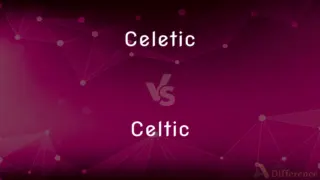
Previous Comparison
Celetic vs. Celtic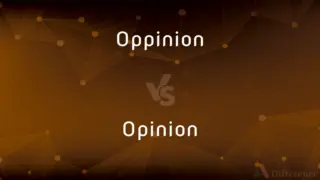
Next Comparison
Oppinion vs. OpinionAuthor Spotlight
Written by
Fiza RafiqueFiza Rafique is a skilled content writer at AskDifference.com, where she meticulously refines and enhances written pieces. Drawing from her vast editorial expertise, Fiza ensures clarity, accuracy, and precision in every article. Passionate about language, she continually seeks to elevate the quality of content for readers worldwide.
Edited by
Tayyaba RehmanTayyaba Rehman is a distinguished writer, currently serving as a primary contributor to askdifference.com. As a researcher in semantics and etymology, Tayyaba's passion for the complexity of languages and their distinctions has found a perfect home on the platform. Tayyaba delves into the intricacies of language, distinguishing between commonly confused words and phrases, thereby providing clarity for readers worldwide.












